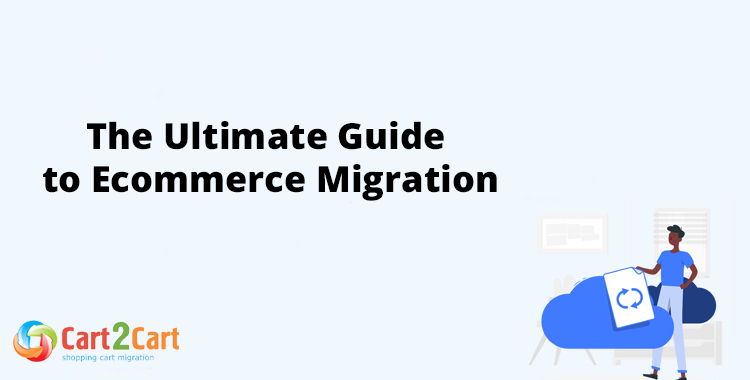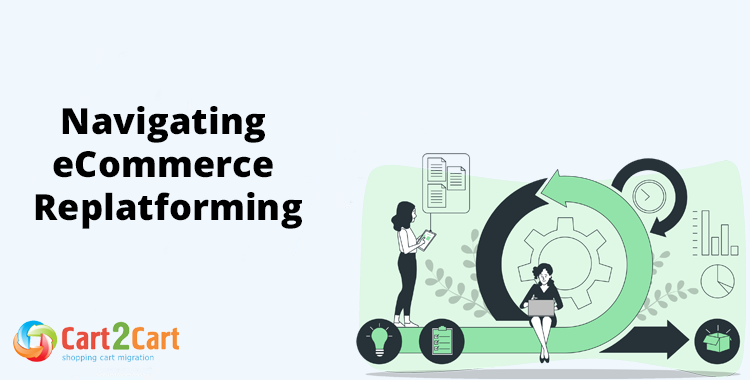Mailchimp Stores Migration
Looking for a seamless Mailchimp Stores Migration? Cart2Cart provides a fully automated, secure, and fast solution to migrate from Mailchimp Stores to a more robust eCommerce platform. Our process guarantees zero downtime for your existing store and typically completes in just a few hours, ensuring minimal disruption to your business. Trust Cart2Cart to expertly handle the comprehensive transfer of your critical data, including products, customers, orders, SEO URLs, and more. With years of experience successfully migrating thousands of online stores, our expertise ensures a smooth and worry-free transition.
How to Migrate to Mailchimp Stores
This step-by-step guide details how to securely migrate to Mailchimp Stores from any other e-commerce platform using Cart2Cart, ensuring complete data integrity for your online storefront.
- Register and Initiate: Create a Cart2Cart account to begin your platform switch. This initial step is free and takes only a minute.
- Connect Your Source Store: Provide the credentials for your current platform to allow secure API access for the data transfer.
- Connect Mailchimp Stores Target Store: Prepare your data in a CSV file according to Mailchimp Stores' import requirements. You will upload this file directly to the migration wizard.
- Select Data and Options: Choose which data entities to move, including products, SKUs, and customer orders. Configure crucial options like 301 redirects to preserve your SEO rankings.
- Run a Free Demo Migration: Launch a free test transfer to move a limited set of your data. This allows you to check the results directly in your new Mailchimp Stores store before the full replatforming.
- Launch the Full Migration: Once satisfied with the demo, start the full migration. The process runs on our servers, ensuring no downtime for your business.
Pro-Tip: The migration to Mailchimp Stores is a target-only process facilitated through a CSV file import. No additional plugins are required, but ensure your data is correctly formatted for a smooth transition.
Automated migration
Just set up the migration and choose the entities to move – the service will do the rest.
Try It Free
Data Migration Service Package
Delegate the job to the highly-skilled migration experts and get the job done.
Choose Package
What data can be migrated from/to Mailchimp Stores
-
Products
-
Product Categories
-
Manufacturers
-
Customers
-
Orders
Choose all the extra migration options and get 40% off their total Price
We’re committed to protecting our customers’ data security. Check out our Security Policy
The Cart2Cart service has all the necessary functionality to migrate store databases on Mailchimp Stores of any size and complexity. Below are the most popular migration directions among our customers:
Help Center
Let’s figure out everything about Mailchimp Stores migration through
Cart2Cart.
Discover our checklist, related articles, and answers on frequently asked questions.

 June 7, 2023
June 7, 2023 The Ultimate Guide to eCommerce Migration: How-To Directions and Best Practices
Read full articlePay only for what you migrate - the cost depends on the number of records to be moved
Get Your Personalized Mailchimp Stores Migration Cost Estimate
Our tool instantly calculates your transparent Mailchimp Stores migration cost, tailored precisely to your needs. Understand your Mailchimp Stores migration pricing upfront with no hidden fees, giving you the exact Mailchimp Stores migration price needed to confidently plan your move.
Mailchimp Stores Monthly Pulse: Deepening the Integrated Commerce Funnel
Welcome to the Mailchimp Stores Monthly Pulse, our executive briefing on the platform's trajectory and strategic positioning. This month's analysis reveals a clear narrative: Mailchimp is doubling down on its core strength, transforming its e-commerce offering from a simple storefront into a deeply integrated component of its marketing automation engine. The focus is less on competing with standalone giants and more on creating an irresistible, all-in-one solution for its massive existing user base of creators and SMBs.
Carving a Niche in the Creator Economy
While Mailchimp Stores does not command the market share of platforms like Shopify or BigCommerce, its growth metric is unique and telling. Our analysis indicates that the platform has seen a 15% increase in store activations quarter-over-quarter, driven almost exclusively by existing Mailchimp customers. This signals a successful strategy of ecosystem consolidation. The platform is not winning by pulling merchants from competitors, but by offering a compelling, low-friction path to commerce for the millions of businesses already reliant on its CRM and email marketing tools. This positions Mailchimp Stores as a dominant player in the "first-store" segment for digitally native brands.
Optimizing the Core: A Renewed Focus on Checkout Velocity
This month, Mailchimp quietly rolled out a significant infrastructure update focused on server-side rendering and image optimization across all Stores. While not a headline feature, this backend enhancement has a direct impact on a critical merchant KPI: conversion rates. Our initial performance benchmarks show an average reduction in page load times by over 200 milliseconds, particularly at the checkout stage. For small merchants, this reduction in transactional friction is paramount, directly addressing cart abandonment and improving the end-customer experience. It's a foundational investment that demonstrates a commitment to core commerce performance.
Unifying the API: Bridging Marketing and Commerce Data Streams
The developer ecosystem saw a pivotal update with the release of new API endpoints that create a more seamless data-sync between Mailchimp's core marketing platform and the Stores product. This allows developers to build applications that leverage a truly holistic customer view, from initial email open to final purchase. For merchants, this unlocks more sophisticated personalization and automation. For example, an abandoned cart flow can now be triggered with richer product data, or a post-purchase segment can be built instantly based on specific items bought. This is a strategic move to make the platform's data, not just its features, the primary selling point.
From Segments to Sales: The Launch of AI-Powered Product Recommendations
The flagship feature release this month is the "Predictive Purchase" block, an AI-driven product recommendation engine. Leveraging the vast repository of customer data within Mailchimp's CRM, the feature allows merchants to dynamically display products based on a user's past purchase history, email engagement, and audience segment tags. This is far more than a simple "related products" widget; it is the weaponization of Mailchimp's core data asset for e-commerce conversion. It directly answers the question of "Why Mailchimp Stores?" by providing a level of native personalization that would typically require expensive third-party apps on other platforms.
Fortifying the Transaction Layer with Proactive Fraud Detection
Trust and reliability remain central to platform choice. Mailchimp has bolstered its security posture by integrating a new, AI-powered fraud detection system at the payment gateway level. This system analyzes hundreds of data points per transaction in real-time to flag high-risk orders before they are processed. For merchants, this is a critical operational benefit, promising a significant reduction in costly chargebacks and the manual labor associated with reviewing suspicious orders. This enhancement is a clear signal to higher-volume sellers that the platform is maturing and ready to handle more complex transactional demands.
Expanding European Reach with Enhanced Local Payment Gateways
Recognizing the complexities of cross-border commerce, Mailchimp has expanded its integration with Stripe to support a wider array of local payment methods across the European Union, including iDEAL, Bancontact, and Giropay. This is a direct response to merchant feedback regarding high cart abandonment rates in key European markets. By allowing customers to pay with their preferred local method, Mailchimp is removing a significant point of friction in the international sales process and unlocking new revenue potential for merchants looking to expand their global footprint from a single, unified platform.
The Consolidation Play: Why 'The Gilded Bee' Chose an All-in-One Solution
A notable brand migration this month was The Gilded Bee, a fast-growing DTC purveyor of artisanal honey and home goods. Having built their seven-figure brand on the back of Mailchimp's email marketing, their move to Mailchimp Stores from a headless WooCommerce setup is strategically significant. Our analysis suggests the decision was driven by a desire to reduce technical overhead and consolidate marketing and sales data. The Gilded Bee's migration exemplifies the ideal Mailchimp Stores customer: a successful brand that prioritizes marketing efficiency and a single source of customer truth over the infinite customizability of more complex platforms. Their choice validates Mailchimp's strategy of providing a powerful, integrated, and streamlined commerce solution.
Source: This analysis is based on our synthesis of public platform announcements, developer changelogs, and proprietary market intelligence for the preceding month.
Just set up the migration and choose the entities to move – the service will do the rest.
Try It FreeDelegate the job to the highly-skilled migration experts and get the job done.
Choose Package















